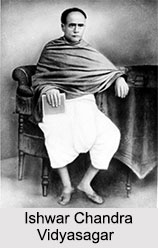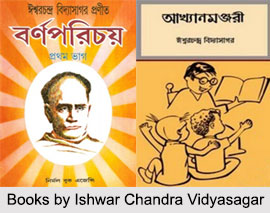 Ishwar Chandra Vidyasagar was one of the foremost figures of the Bengal renaissance, whose scholarly contributions to Sanskrit and Bengali are equalled by the social reforms he affected on the milieu of his time. Though born impoverished, Vidyasagar grew up to be a highly influential polymath, an expert writer, philosopher, educator, publisher, reformer, philanthropist, academic, entrepreneur and activist, whose legacy is still honoured by Indians from all over the country. He is credited with the simplification and modernisation of Bengali prose, and the modernisation of the Bengali alphabet. His social reforms did much to rid the country of its rampant casteism, especially in the teaching of Sanskrit; and Ishwar Chandra Vidyasagar was one of the earliest proponents of women"s rights; campaigning for widow remarriage and establishing schools for women.
Ishwar Chandra Vidyasagar was one of the foremost figures of the Bengal renaissance, whose scholarly contributions to Sanskrit and Bengali are equalled by the social reforms he affected on the milieu of his time. Though born impoverished, Vidyasagar grew up to be a highly influential polymath, an expert writer, philosopher, educator, publisher, reformer, philanthropist, academic, entrepreneur and activist, whose legacy is still honoured by Indians from all over the country. He is credited with the simplification and modernisation of Bengali prose, and the modernisation of the Bengali alphabet. His social reforms did much to rid the country of its rampant casteism, especially in the teaching of Sanskrit; and Ishwar Chandra Vidyasagar was one of the earliest proponents of women"s rights; campaigning for widow remarriage and establishing schools for women.
Early Life of Ishwar Chandra Vidyasagar
Ishwar Chandra Bandopadhyay was born in a Kulin Brahmin family at Birsingha in Midnapore district in the state of West Bengal, on 26th September 1820. Vidyasagar spent his childhood in abject poverty. Vidyasagar commenced primary education at the village "Pathshaala" - an indigenous Indian school where language, grammar, arithmatic and other Shastras were taught to youngsters. His childhood was full of learning, as his father Thakurdas Bandopadhyay was a teacher of Sanskrit and wanted his son to follow his profession. Vidyasagar"s mother, Bhagabati Devi had a strong spiritual influence on him all his life. In the year 1839, Ishwar Chandra Vidyasagar graduated in the law examination conducted by the Hindu Law Committee.
Career of Ishwar Chandra Vidyasagar
 At the age of 21, Ishwar Chandra Vidyasagar started his career as the Principal of the Fort William College, Calcutta (now Kolkata). He joined Sanskrit College as a professor in 1850. In the following year, Vidyasagar became Principal of the college. Concurrently with his position in the Sanskrit College, the Government entrusted Vidyasagar with the added responsibility of Special Inspector of Schools for the districts of Hooghly, Bardhaman, Midnapore and Nadia, in the year 1855. Ishwar Chandra Vidyasagar was also an honorary office bearer of several organisations including the Asiatic Society and Bethune Society. In 1858, he was made one of the first fellows of the University of Calcutta.
At the age of 21, Ishwar Chandra Vidyasagar started his career as the Principal of the Fort William College, Calcutta (now Kolkata). He joined Sanskrit College as a professor in 1850. In the following year, Vidyasagar became Principal of the college. Concurrently with his position in the Sanskrit College, the Government entrusted Vidyasagar with the added responsibility of Special Inspector of Schools for the districts of Hooghly, Bardhaman, Midnapore and Nadia, in the year 1855. Ishwar Chandra Vidyasagar was also an honorary office bearer of several organisations including the Asiatic Society and Bethune Society. In 1858, he was made one of the first fellows of the University of Calcutta.
Social Reforms by Ishwar Chandra Vidyasagar
Vidyasagar was a tireless reformist throughout his career; on becoming the principal of Sanskrit College, he immediately opened the courses to all castes, whereas only Brahmins had been eligible until his decree.
He was an early proponent of women"s rights. Observing that women had no educational avenues in India, he opened as many as 1200 schools for women. Vidyasagar introduced widow remarriage to uplift the Hindu society. He proposed the Widow Remarriage Act in 1856, and set up a Hindu Family Annuity Fund to support poor and impecunious widows. Ishwar Chandra Vidyasagar"s reforming mentality has found the most concrete expression in his socio-religious thoughts. In his writings, he raised questions about early marriage, polygamy, widow remarriage and many other ills stifling social conditions of his time.
Towards the end of his life, Ishwar Chandra Vidyasagar spent 18 years in Karmatar (now in Jharkhand) amongst the Santhal tribes of the area, where he established a school for children and a night school for the adult villagers.
Achievements of Ishwar Chandra Vidyasagar
Ishwar Chandra Vidyasagar was an achiever all his life. During his graduation he gained mastery in many Shastras or disciplines. He received all the awards and scholarships for best performance. Ishwar Chandra Vidyasagar received a certificate of Honours at the Imperial Assemblage in January 1877. He also received honours and felicitations from many social, cultural and scientific organisations. He received the title “Vidyasagar†meaning Ocean of Knowledge, from Sanskrit College due to his excellent performance in Sanskrit and Philosophy.
Vidyasagar gave a new direction to Bengali Prose. He introduced a new era for Bengali literature. Ishwar Chandra Vidyasagar"s significant achievement was in laying down the foundation of modern Bengali Prose.
Ishwar Chandra"s principles, determination and courage were unparallel in every detail. India remains indebted to this great reformist, thinker and activist named Ishwar Chandra Vidyasagar.




















